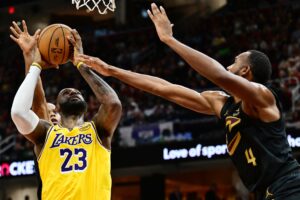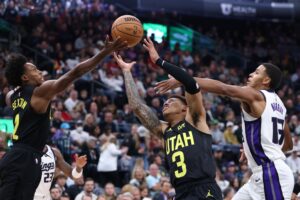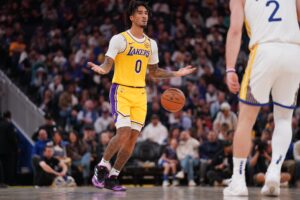During the 2016-17 NBA season, headlines will be dominated by Kevin Durant and the Golden State Warriors on a daily basis. However, having a super-team doesn’t guarantee a championship; just look at the 2012-13 Los Angeles Lakers. Everything can change and anything can happen in the NBA. A team can implode, the injury bug could strike, or a team simply might not play to its potential. In this Last Word On Pro Basketball series, we’ll break down which two key factors will determine the fate of each NBA team in the upcoming season.
In this edition, we’ll take a look at the Portland Trail Blazers.
Two Key Factors to a Successful Portland Trail Blazers Season
The Trail Blazers did well to re-sign all of their restricted free agents, along with acquiring excellent players in Evan Turner and Festus Ezeli. They also extended the contract of head coach Terry Stotts until 2020, after Stotts finished a close second to Golden State Warriors coach Steve Kerr in the NBA’s 2015-16 Coach of the Year vote. After losing four starters, 2015-16 was expected to be a season of re-building for Portland. However, Stotts and the Trail Blazers managed to achieve a 44-38 record, clinching the fifth seed in the Western Conference. Portland can only have grown from that experience; the two key factors below could propel the Blazers even further.
First Key: Portland’s Abundance of Depth
This year, Trail Blazers are spoiled for choice. Before the 2015-16 season, losing four important players meant that Portland needed to bring in the right young players to help them become contenders over the next few years. Many experts projected them to finish outside of the top eight in the Western Conference. Instead, the Trail Blazers made it to the second round of the Western Conference playoffs under the tutelage of Terry Stotts.
This astonishing result proved that the Blazers had indeed found the right players, which meant that this season would be about adding more pieces to make an immediate impact. Now, it seems that Stotts will struggle to distribute his minutes among his players, while attempting to both win games and develop players. This coming season, Damian Lillard, C.J. McCollum, Al-Farouq Aminu, Allen Crabbe, and Mason Plumlee, as well as the aforementioned Turner and Ezeli, will all be vying for a starting role. This does not even take into account the impressive play of Maurice Harkless, who eventually won a starting spot come the end of last season.
The Addition of Evan Turner
This article does not even go into depth about the addition of Ezeli, who is an elite center in his own right. Evan Turner is just such a good addition on his own, so let’s focus on why. With C.J. McCollum sure to start in the shooting guard position, Turner, if he was to start, would most likely occupy the small forward role. But competition is high for this position as well, with Aminu starting to shoot the deep-ball more efficiently and Harkless also proving his worth as a starter late in the season. However, this competition can only mean good things for Portland.
Turner offers different abilities than both Harkless and Aminu, both of whom are primarily valued for their perimeter defense. Defenders would sag off of Aminu and Harkless to focus their attention on Lillard and McCollum last season, making the former two rather impotent on the offensive end. Turner will be able to alleviate some of the scoring and play-making pressure from McCollum and Lillard, which Portland desperately needed last season, particularly in the playoffs.
Turner struggles with his deep shooting, but he possesses a knock-down mid-range shot and can burn defenders driving to the rim. This offers an extra dynamic to the shooting guard position, with the other alternative, Allen Crabbe, driving to the basket just 1.2 times per 36 minutes, compared to Harkless’s 3.2 and Turner’s 4.9. In Boston, defenders would also sag off of Jae Crowder and Marcus Smart, forcing Turner to weave his way through multiple defenders in the paint. With McCollum and Lillard spreading the floor and drawing defenders to the perimeter, Turner will have more freedom and should therefore become a more efficient scorer.
With the addition of Turner, Portland has added dynamism to their roster. Last year, when Harkless became inefficient on the offensive end, Stotts’ only alternative was to play Crabbe, who struggled on defense. So it was a choice between offense and defense, but not both at the same time. Turner is a very good perimeter defender. Last season, Turner ranked in the top five of guards in the NBA for defending three-point shooters (minimum 65 games played). The opponents who Turner guarded on the perimeter shot 35 percent from deep, and his mid-range defense also puts him in the elite defensive category, with only a 4.5 percent difference. With that being said, we will now take a look at the second key for Portland next season.
Second Key: The Guards Must Defend Better
It would be easy to argue that Lillard and McCollum are the in the top three for offensive back-court tandems in the NBA. McCollum blossomed in his starting role last season and went on to win the league’s Most Improved Player award. Lillard not making the All-Star Game was an injustice, and he proved as such, especially towards the second half of the season. Together, the two combined for 45.8 points and 11.1 assists per game. It is harder, however, for me to argue that they are in the top three back-court duos when assessing their defensive efforts.
Last Season
After losing four of their starters going into the 2015-16 season, after ranking in the top five to ten defensively the past two seasons, the Trail Blazers seemed especially deficient on the defensive end. There is no doubt that Portland is an elite team offensively – possibly efficient enough to contend for the title. But for all Portland’s offense, it has always been proclaimed that defense wins championships. The Blazers ranked 21st in defensive efficiency last season. While their rim protection was stable enough, Stotts’ team struggled at closing out on three-point shooters.
Although we saw slight improvements on the defensive end, Lillard remained one of the game’s worst defenders by both the eye test and advanced stats. He and McCollum finished 13th and 12th, respectively, among Blazers players in defensive box plus/minus (BBPM). Furthermore, three Portland players were among the ten worst three-point defenders in the league – more than any other team. Gerald Henderson occupied the worst spot in both three-point defense percentage (46.4%) and percentage point differential (10.7%). Fortunately, Henderson has been replaced by Turner, who occupies the opposite end of both of these statistics. Crabbe was a particularly bad perimeter defender last season (40.7% defensive field goal percentage) and Lillard was not too far behind him in that same category (40.1%).
Moving Forward
Towards the end of the season, Stotts made a few changes to his rotations, which improved Portland’s defense ever so slightly. Harkless saw his minutes double, Noah Vonleh‘s minutes were cut by a third, and Meyers Leonard faced a lengthy spell on the sideline due to injury. As a result, the Blazers became slightly more efficient on the defensive end. Before those changes, they had been giving up 108.7 points per 100 possessions; that number improved to 107.4 for the final 11 games after the lineup changes.
This defensive improvement is not drastic by any means and can still hardly be considered ‘good’ defense. It’s also hard to draw any conclusions from 11 games down the stretch, and the improvements might not have even been a direct result of the lineup changes. But one thing is for certain: Turner and Ezeli will bring added defensive coverage, as well as rebounding. Even if Turner’s defensive contribution is average, this will still be a huge upgrade over one of the worst defensive players last season (sorry, Gerald Henderson).
Ezeli’s Defensive Impact
Ezeli will also add some extra rim protection and muscle in the paint. Given that Ezeli is a center who could easily start on many NBA teams, Portland is blessed in the big man department. This is exactly why Ezeli was brought into the team, with Stotts himself saying in a preseason interview that Ezeli is there to bring extra rebounding and rim protection. Interestingly enough, Stotts also claimed that he was brought in to introduce a smaller Portland lineup: “In today’s NBA, particularly with the plan of playing Farouq at the 4, [Ezeli] is going to give us the ability to play a smaller lineup and still have a defensive component to it.’’
In 16.7 minutes per game over 46 contests for the Golden State Warriors last season, Ezeli averaged 7.0 points, 5.6 rebounds, and 1.09 blocks per game. Stotts believed that Ezeli was one of the best defenders on one of the league’s top defensive teams. With new-found dynamism, an upward trending defensive effort, and more stability come next season, the Trail Blazers find themselves in a good position. But, for all of their offensive power, they still seem to be an average defensive team. This does not look like a championship team, but it is still one that could, potentially, make a deep playoff run.
Main photo:






